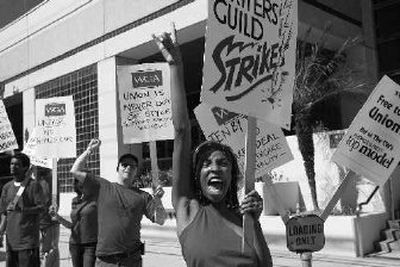It’s a wrap — already

LOS ANGELES — Hollywood studios are speeding production on movies and TV shows, preparing for a possible strike by writers and more trouble next year when contracts with actors and directors expire.
TV networks, which are in the midst of planning fall schedules, also might pack their lineups with more reality shows and other unscripted fare as protection against a possible strike.
“It’s simply sound business,” said J. Nicholas Counter, president of the Alliance of Motion Picture and Television Producers, which negotiates on behalf of the studios.
“Based upon the public statements of the Writers Guild, it’s quite clear these are going to be very contentious negotiations,” he said. “Their statements are bellicose, so we’ve got to prepare for the worst.”
Among the shows accelerating production is NBC’s “Las Vegas,” which started three months earlier than usual with the aim of finishing 18 to 24 episodes before the fall. Normally, the show would have only about seven or eight episodes filmed.
“In essence, it makes us strike-proof,” said Gary Scott Thompson, the show’s writer and executive producer and a veteran of the last writer’s strike in 1988.
Another NBC show, “Law & Order: Special Victims Unit” began shooting two months early.
The three-year pact between studios and the Writers Guild of America expires Oct. 31 and talks are scheduled to begin in July.
That gives both sides little time to resolve complex issues involving how much TV and film writers should be paid when their work is distributed on new media platforms, including the Internet, cell phones, digital media players and other devices. The writers argue the payments — modeled after the structures used for DVD rights — are too low.
Older battles also remain to be resolved, including the revision of a decades-old formula for compensating writers for work that appears on DVD.
“There’s no question in my mind this is not simply about emerging technology, but the perception that the guilds pretty much got screwed in previous negotiations in what were then emerging technologies,” TV writer and producer Steven Bochco said.
“All the guilds feel strongly that they don’t want to be caught in a position that doesn’t anticipate rapidly shifting technological advancements that leave them high and dry.”
Bochco, the Emmy Award-winning creator of such shows as “NYPD Blue” and “Hill Street Blues” is creating a legal drama pilot for TNT. He said the issue of stockpiling always arises as a negotiating tactic.
Both the WGA and Screen Actors Guild elected new leaders after the current contracts were signed who have promised to get tougher with studios.
The WGA, in particular, has led an effort to organize the editors and producers the guild say actually “write” reality TV shows. Several lawsuits have been filed against networks and the union supported a brief strike by about a dozen staff of the show “America’s Next Top Model.”
Actors and writers have also taken a tough stand against the increasing use of product placement in shows, a growing practice as more people zap ads recorded on a TiVo or similar device. The guilds have said their members deserve a piece of the revenue generated by the mention or appearance of products.